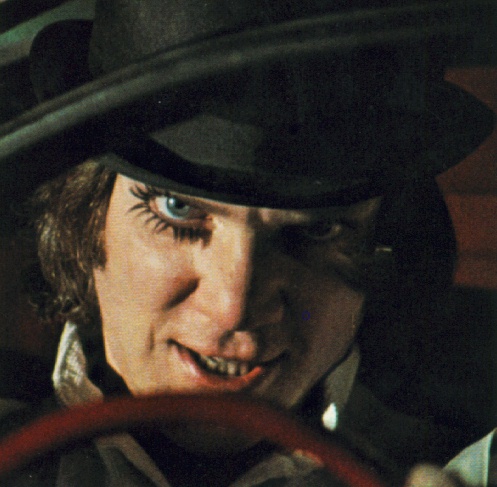I've been making a conscious effort in reading classic novels, and for the longest time, waiting for when I'd finally get my hands on a copy of 1984 by George Orwell in a second-hand bookstore. No such luck, so far, but I managed to find A Clockwork Orange by Anthony Burgess in a stall near the grocery.
I've never seen the film, but the novel was quite interesting. It tells of Alex, a teenager living in a presumably futuristic setting. At fifteen, he and his teen aged friends go around at night mugging people on the streets and generally being rascals.
One night, Alex kills an old woman in a house full of cats. He is arrested and in prison, researchers use on him this "Ludovico Technique", which has him strapped to a chair and made to watch films of violence and cruelty while an intravenous medicine works its magic on him and makes him suffer extreme nausea. This sort of conditioned reflex works on him and he is "cured"; every time an idea of committing violence goes through his head, he remembers the illness and nausea that he has begun to associate with violence and cruelty. He is then let out of prison. Once out, he discovers that he lost the life that he once had, that things aren't any more the same and that most every one that knew him before are now out to get their revenge from him. He commits suicide by jumping off a building, but was unsuccessful. The fall "cured" him out of the conditioned reflex; he then does not anymore fall ill at the thought of violence, but when he decides to go back at mugging and being a rascal, he begins to feel bored of the idea. He thus contemplates on becoming a productive member of the society and muses if his future children will ever become violent just as he used to be.
One night, Alex kills an old woman in a house full of cats. He is arrested and in prison, researchers use on him this "Ludovico Technique", which has him strapped to a chair and made to watch films of violence and cruelty while an intravenous medicine works its magic on him and makes him suffer extreme nausea. This sort of conditioned reflex works on him and he is "cured"; every time an idea of committing violence goes through his head, he remembers the illness and nausea that he has begun to associate with violence and cruelty. He is then let out of prison. Once out, he discovers that he lost the life that he once had, that things aren't any more the same and that most every one that knew him before are now out to get their revenge from him. He commits suicide by jumping off a building, but was unsuccessful. The fall "cured" him out of the conditioned reflex; he then does not anymore fall ill at the thought of violence, but when he decides to go back at mugging and being a rascal, he begins to feel bored of the idea. He thus contemplates on becoming a productive member of the society and muses if his future children will ever become violent just as he used to be.

What struck me most in this novel was the way that some of the characters thought ill of the Ludovico Technique. At first, I didn't. I thought it was a great idea of reforming criminals and people who have committed crimes. The methods might be a bit crude: i.e., strapping someone to a chair and injecting nausea-inducing chemicals on him, but these could be adjusted a bit. The author talked of not having a "choice", that criminals made to experience the Ludovico Technique are no better than a "clockwork orange", a mindless machine with no free will and a slave only to the government's bidding.
Still, maybe, when a government is given a powerful tool like the Ludovico Technique, anyone may be brainwashed into thinking and behaving the way that the wielder of the Technique wants them to think and behave.
The whole idea of brainwash and conditioned reflex happens every day and to every one, I believe. For example, through television and movies, we are often bombarded with ideas that beauty, wealth and being thin are associated with goodness. It takes a certain level of intelligence and critical thinking to resist the thinking of the "herd", the way they are "herded" by the powerful few to think and behave. The way that every one is herded into thinking is done subtly, that it is hardly noticeable. Whatever makes a middle-class working girl spend a whole month's salary on a single pair of shoes, or hang out at fashionable bars, when cheaper options would do nicely for her? What makes a forty something desk laborer spend half of his kid's college fund on botox injections? And it is not only wealth or beauty. How about races? Genders? Professions? Why do they always portray lawyers as bloodsucking ambulance chasers in movies? Why is a wife often doing the dishes or picking up the kids in an S.U.V.? We are influenced, gently yet repetitively, to think and behave the way some people out there want us to think and behave.
The Ludovico Technique, in a way, may be alive and present and very much active here and now in ways that we can never imagine.